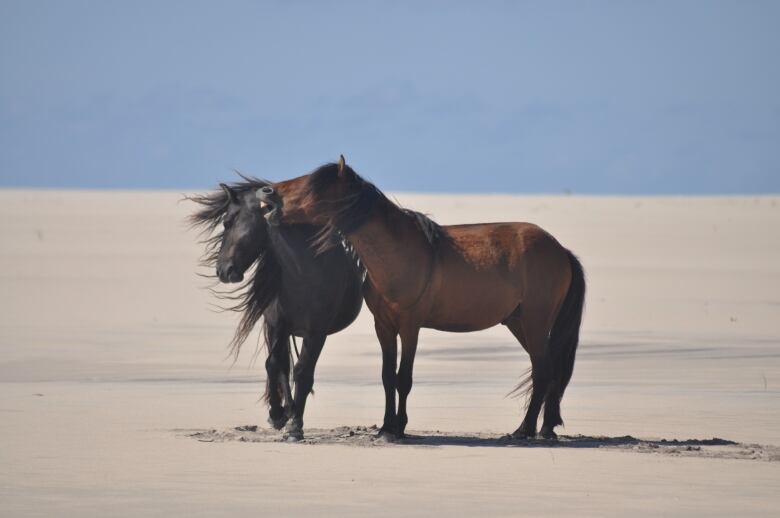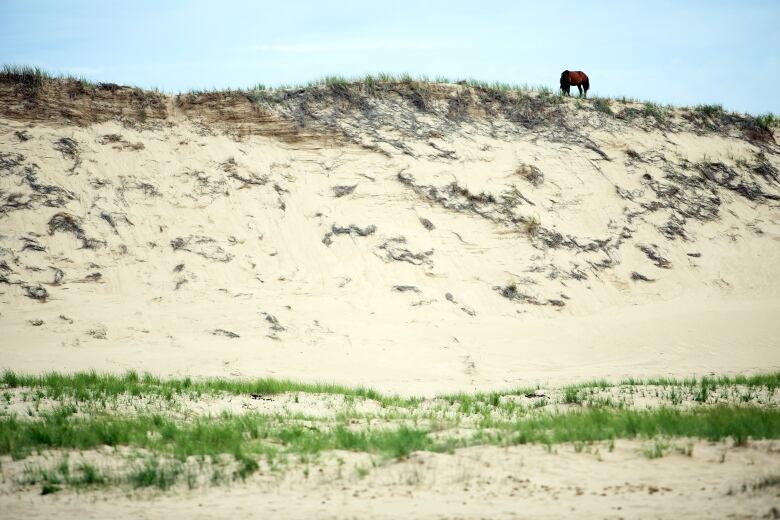Sable Island horses should be removed, says biologist
Response to report saying the feral horses may be under threat from extreme weather
Ian Jones, a biology professor at Memorial University in St. John's, refutes a Parks Canada report saying Sable Island's feral horses are threatened with extinction due to global warming, and he recommends they be taken from the island in order to be saved.
"I don't think there's any immediate worry about them disappearing any time soon,"Jones, a specialist in remote island ecosystems, told CBC News on Saturday.
"And extinct is the wrong word ... they were domestic horses brought over and abandoned on the island."
- In Depth | Sable Island: A living treasure
- Sable Island: The wild horses' history and future
- Sable Island: Should the feral horses be removed?
According to a scientific report ordered by Parks Canada, excessive inbreeding, a tiny population and extreme weather linked to global warming all pose risks of extinction to the fabled horses. Parks Canada is the newly appointed custodian of the historic sand crescent that lies about 175 kilometres off the Atlantic coast of NovaScotia.
The herd,first introduced to the island in the1760s and left to fend for itself since 1960, now numbers more than 500 animals but the population could drop precipitously after just one harsh winter, with food hard to access under heavy snow or ice, according to the study. The ponies also may suffer from low genetic diversity, making them less resilient to disease and prone to reproductive failure.
But Jones argues the horses "hurt" the island and "cause destruction."
"Remote island ecosystemsare the most endangered ecosystems," he said. "Sable Island is such a place and the horses are modifying the island. They need to be removed."
Jones adds that the island's environment is hurting the horses.
"I love horses ... and I certainly wish the very best for those horses," he said. "Every bite they take, they get a mouthful of sand and grass. Their teeth are wearing away. They endure a lot of suffering because of the climate.
"If you or anyone kept horses in these conditions on your farm, you would be charged and convicted with cruelty to animals."
Graveyard of Atlantic
Last December, Parks Canada formally relieved the province of Nova Scotia of its stewardship over Sable Island, sometimes called the "graveyard of the Atlantic" because of themore than 350 ships wrecked off its wave-washed beaches in the last 400 years.

To assess its new responsibilities, Parks Canada solicited a 400-page report on the island, from lichens and beetles to the number of tarballs washing ashore.
Report author Bill Freedman, a respected ecologist with Dalhousie University in Halifax, acknowledged in an interview with CBC News that many scientists regard the horses as ecologically intrusive and best eliminated from the treeless, 30-square-kilometre island.
"I also know that what little research has been done suggests that the horses aren't the greatest threat to the ecological integrity of the place," he said.
Already faced extinction
The herd last faced extinction in 1960, when the federal government ordered all the animals removed from Sable Island, some of them apparently destined to become dog food. The move was justified as humanitarian, as many of the horses had died of starvation and other causes following a harsh winter.

But a public outcry, which included plaintive letters from schoolchildren and articles in the New York Times, prompted Prime Minister John Diefenbaker to rescind the removal order and make it illegal to interfere with the herd.
Jones slams Parks Canada for allowing the horses to remain, noting that some bird species are directly threatened by the heavy hooves and foraging of the horses.
"If you love horses, support the idea of removing then and bring them to a place where they can have a healthy life span."
- Sable Island: A national park in the middle of a gas field
- Sable Island: Shifting sands of an island in motion
Parks Canada has stated that theFreedman document "will inform the upcoming management plan [for Sable Island], which will also be based on public consultation and other science-based input from the research community."
Spokeswoman Theresa Bunburyhas said the agency is still reviewing the content of Freedman's report, but spoke in support of the horses remaining.
With files from Dean Beeby













_(720p).jpg)


 OFFICIAL HD MUSIC VIDEO.jpg)
.jpg)



























































































